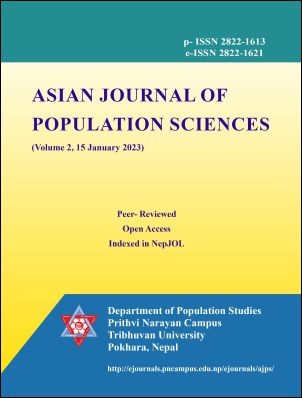The Menstrual Impurity of Women and Girls: Chhaupadi Practice and Resistance
DOI:
https://doi.org/10.3126/ajps.v2i1.51094Keywords:
Chaupadi, Chau Goth, Menstruation, Socio-Cultural traditionAbstract
The practices and beliefs attached to menstruation in different parts of world vary across time and space and have been shaped by various factors such as: gender, religion, society and culture. Although menstruation is a natural biological phenomenon, the social taboos and stigma attached with the practice isolates and detach women and girls from doing their everyday normal activities. Nepal is a secular country but due to its traditional gender norms and values practices, the menstruating women are suffering from physical and psychological problem where menstruation is not simply a biological phenomenon but become socio-cultural practices. Nonetheless, customs attached with chhauapdi has been changing among young generation in new place other than home. This paper examines the way how menstruation is socially constructed despite the fact that it is biological phenomenon. The shared norms, values and tradition associated with these practices put an individual life at risk. The study uses both secondary literature review and primary data collection method. The field work was conducted in Bajhang and Doti district of Karnali Province in the month April 2020 through an intensive case study and focus group discussion. The major finding of the research suggests people were still practicing Chhaupadi without any trouble. Nevertheless, the customs has been practice in modified way among the new generation people. The dignity of women attached with practice should be defined from insider’s view rather than outsider intervention in demolishing the practice.
Downloads
Downloads
Published
How to Cite
Issue
Section
License
Copyright (c) 2023 Anchala Chaudhary

This work is licensed under a Creative Commons Attribution-ShareAlike 4.0 International License.
This license enables reusers to distribute, remix, adapt, and build upon the material in any medium or format for noncommercial purposes only, and only so long as attribution is given to the creator. If you remix, adapt, or build upon the material, you must license the modified material under identical terms.




